#jjba character analysis
Text
Thinking about how Jotaro Kujo is The Tragic Character™️ of JJBA. Araki simply cannot let that man be happy. He fr said “you can fit so much trauma into this bad boy”!
His entire life was so tragic that we all knew he was going to die, eventually.
His Mother’s life was endangered and on the journey to save her he gains significant trauma from people trying to KILL him and then lost three friends at the ripe old age of 17.
He goes to University, meets a woman he falls in love with, and has a kid. realizes that as long as there’s a threat of enemy stand users wanting revenge for Dio his family will never be safe so he has to leave his family behind and distance himself.
Became a older brother/father figure to Josuke but had to leave him because he knew he would bring enemy stand users into that poor boys life- the only Joestar that had a somewhat of a shot at being normal.
Then in part 5 it’s revealed that when he got separated from Polnareff, Diavolo paralyzed Polnareff. He’s probably carrying guilt from that. He’s also probably stressed asf at first that the son of the vampire who tried to adamantly kill him is just out there somewhere. Thank god Giorno took after Jonathan 😭.
Then in part 6, he had to face his failures as a father, understanding that he didn’t deserve and probably would never get Jolyne’s forgiveness, but it’s so clear to me that Jotaro wanted to be there for her. But of course, to him, the only way he can protect people is to push them far away from him. He never learned that he is stronger in numbers because whenever he was in numbers, someone he loved got hurt.
Jotaro never understood he deserved the happiness of a loving family.
He couldn’t even save his daughter (and he dies believing that Jolyne hates him because he knows he’s a shit father AND WAS OK WITH IT AS LONG AS SHE GOT TO LIVE 😭😭😭) in the process.
He’s a Greek Myth type of sadness.
#Araki could not let Jotaro catch a break gAWD#anime rant#jjba#jojos bizzare adventure#jotaro kujo#jolyne kujo#jotaro and jolyne#part 6 jotaro#jjba stone ocean#stone ocean#golden wind#vento aureo#stardust crusaders#diamond is unbreakable#part 4 jotaro#jean pierre polnareff#jjba part 3#character analysis#character study#he’s so tragic#jjba spoilers
1K notes
·
View notes
Text
The first Moomin book came out in 1945 and the last in 1993.
The Moomin animated series came out in 1990.
So it’s not unreasonable to believe, that Risotto Nero, leader of the hitman team, both read and watched the Moomins, which led to Metallica’s (Stand) Hattifattener design.

If I were to write a head-canon, that the same Risotto, who murders people for money, was reading the Moomins to at night in his childhood and probably owned a stuffed Moomintroll, it can chronologically make sense.
Now since he murdered his cousin’s murderer in 1991 (1973+18), it isn’t unreasonable to believe, that afterwards he went home, washed himself off of the blood, changed and sat down in front of the television to watch an episode of the animated series. Then cried about his childhood and loss of it, yet also finding a certain type of outlet for his pain in remembering it.
Metallica (stand) is in his blood to fill up the emptiness inside him and, as his childhood was killed when he was 14, it also fills up his empty childhood by looking like something from his childhood.
But, as he himself has become, it is twisted and grief stricken, stitched together after an unfortunate accident and never properly healed.
#jjba#la squadra#jojos bizarre adventure#jjba vento auero#risotto nero#moomin#hattifatteners#metallica#stand#stand analysis#funny how my love for Metallica (Band) and my childhood of Moomins comes together perfectly in my favourite character#keeping this for a fanfic that I should’ve written instead of writting this
112 notes
·
View notes
Text
The thing about Josuke is that, since the age of four, he's had 24/7 access to a secret superpower that lets him instantly and completely fix anything that goes wrong in his life. Anything that breaks, anyone that gets hurt, anything that happens and has a negative result can be immediately rewound and brushed off as if it never happened with nobody ever the wiser; after all, it's not like anyone he's met can even SEE his stand, let alone realize he's using it to do anything. Even if he does it while someone else is present, would they really believe that Josuke has some sort of healing superpower over the idea that they were just wrong about the thing having been broken in the first place? Probably not.
What kind of effect would that power have on a developing kid?
Imagine that he's playing a video game and he's getting really frustrated because he keeps dying in the same place over and over. If that happened to you, what would you do? Maybe gear up to chuck the controller into the TV? But, wait, you can't do that! If you did, it might be satisfying for a second, but then you'd have to deal with the fallout of a broken TV and an angry parent. Not worth it. Josuke, on the other hand? If HE totally destroyed the TV, he could have that momentary satisfaction of letting the frustration out, then just quickly fix the TV and get back to the grind. No harm, no foul, no bits of glass to sweep out of the carpet or mother tearing her hair out in upset. Of COURSE he'd do it. Why wouldn't he?
Imagine that he forgets his locker combination, because oops head too full of teenage miscellany. Would he go through the effort of fumbling around to find whichever pocket he shoved the slip of paper with his combination in to open it while he's already late to class? Or would he just tear the door off its hinges, retrieve his stuff, and shove it back on in two seconds flat? Imagine that he's messing around with some friends trying to climb a huge tree, when one of them falls getting two broken bones and a concussion. Would he call the friend an ambulance and decide climbing tall trees is too dangerous? Or would he just climb down, heal the friend back up, say something to the effect of "oh wow, good thing you ended up okay!", and continue doing what he was doing safe in the knowledge that his stand could save him or cushion the fall if HE ever slipped? (He may not be able to HEAL himself, but he can certainly protect himself from the same kinds of damage other people get.)
Those are all just hypotheticals, but we do see examples of him doing those kinds of things in the series. He beats up anyone who pisses him off only to instantly heal them afterwards. He tears off Hazamada's locker door to look inside without a second thought. In the wake of his grandpa's murder, he destroys and fixes a ton of furniture in his house. He mentions fixing a friend's broken leg. He DEFINITELY doesn't shy away from anything dangerous, and not just out of general shounen recklessness. When Aqua Necklace hides inside his mother's body, he forgoes any convoluted plan to save her and just punches her through the stomach without hesitation because he knows with 100% certainty, the certainty of lived experience, that she'd be completely fine afterwards, that she wouldn't even notice. He waited to try healing his grandpa when he saw him sprawled across the floor because he didn't have a doubt in his mind that, even if he took his time getting there, as soon as he did he'd be up again like nothing happened. (He was only wrong once.)
The thing about Josuke is that, since the age of four, he's learned that being reckless almost never leads to consequences. He's learned that its okay to make mistakes because pretty much any mistake he makes can be quickly and easily fixed with no lasting damage. He's learned that, as long as he's the one who takes responsibility for something, everything turns out okay for everyone.
We can see all that easily in his personality and the way he acts. He's unbelievably chill, cool-headed and reasonable even in situations where NOBODY would be; stakes are very different for somebody who can effortlessly reverse anything short of death, so of course he doesn't panic at those sorts of things. By contrast, things like "no money" or "waded into leech pool" (or, for a more serious example that comes up in the series, "friend/family is missing") are not as easily fixed and thus are a much bigger deal.
Despite how much it takes to make him full on panic, though, he is far from careful on a regular day. Sure, he may be chill, but all that means is that he'll calmly and deliberately do something insane instead of doing it in a panicked frenzy. We see dozens of examples of Josuke casually thinking his way out of situations by coming up with a crazy reckless solution on the spot that would be a last-ditch measure by anyone else, just because he's so used to thinking with his stand's ability in mind. (While you could maybe argue this applies to most Jojo protagonists, I still think Josuke manages to be one of the most reckless on-the-spot planners in the series while also being one of the most generally well-collected AND having a solidly in-place sense of self preservation, which is still an interesting combination in contrast with the other protagonists.)
It's worth noting, of course, that Josuke DOES have a bit of a (literal) hair-trigger temper, but rages on Josuke are short, concentrated, and in a strange sense, controlled. While he's certainly much less reasonable and more destructive than usual when in rage mode, said destruction never extends past the source of the anger; he feels mad, so he lets it out, handles the situation, and almost instantly falls back to baseline. Like chucking a controller at a TV and fixing it back up. A controlled explosion.
All of this is to say that, even when Josuke does reckless or destructive things, it's not because Josuke himself is a reckless or destructive person; far from it. Josuke's top priority is keeping the peace. Why else would he choose to be so meek towards bullies on the first day of school, even knowing he could wipe the floor with them? Why else would his first reaction to being told he was the result of an affair be to humbly apologize for the trouble his existence caused, instead of any kind of personal confusion or upset? The only reason he acts how he does is because he knows from experience that inserting himself into a situation, striking fast and hard however is appropriate, then fixing up the aftermath, is the most efficient way to solve problems for himself and everyone around him. He's not a pushover. He'll stand up for himself and what's important to him when he needs to. But ultimately he just wants the best for everyone, and since he's been gifted the ability to fix things, to heal, doesn't it make sense to use it?
In that way, Josuke acts as a perfect foil to Kira. Neither of them deny themselves whatever they want, neither of them are used to experiencing consequences for their actions, and both of them just want a peaceful life; the difference is, Kira destroys problems. Josuke fixes them.
An interesting side effect of this mindset is that Josuke ends up taking on responsibility for all sorts of things that are in no way his burdens to bear. We see a number of times throughout the series that he never backs away from a situation he could potentially do something about, to the point of even inserting himself into situations he really doesn't need to. Any time he CAN heal someone, he does; in the Harvest episode, in particular, Josuke heals a number of tiny injuries Okuyasu picked up without comment as soon as he could. It's so ingrained that, during their dice game, Rohan mutilates himself in order to keep Josuke from running away, since he knew Josuke would never leave him like that even though they hate each other. Of course Josuke would consider it his responsibility to heal the hand Rohan messed up himself such that he'd stay in a terrible situation he could easily walk away from just for the opportunity to heal him. It's a no-brainer.
And because Josuke takes on so much extra responsibility, because Josuke is considered by both all his friends and himself to be the multi-purpose get out of jail free card, he takes it that much harder whenever anything seriously goes wrong. There's almost a level of existential disbelief to it. Sure, anybody would be upset when something bad happens, like, say, a family member or friend dying because of your own negligence, but with Josuke... When his grandpa dies, and then paralleled later when Okuyasu gets blown up by Killer Queen, he sounds confused. Like he just experienced something impossible. People can't die around him. It's not even a question. He has a healing superpower! People can't die around someone with a healing superpower, especially not when they're literally a few steps away!! So, then, if it really did happen, what does that say about him? When he gets the call from Koichi during the fight against Sheer Heart Attack, he panics and rushes into action immediately. It's easy to imagine what could have been flashing through his mind.
Because of his stand, the stand he got after a formative experience when he was just a small kid, he always has the unique ability to help. To help himself, to help others. All he has to do is put in the effort, show as much kindness as he can as soon as it's needed, and he can keep everyone happy and healthy. At the end of the day, if he can do something, he will. Every time.
The thing about Josuke is that, since the age of four, he decided that he wanted to be like the person who saved him when he and his mom were stranded in the snow. He saw the way that guy went out of his way to help a total stranger, showing kindness to people who needed it more than he could ever know, taking off his coat in the cold despite his own injuries just because it was the right thing to do, and he thought: "I want to be like that". Through that decision, he received the power to do just that. Over the years, he used that power again and again; for himself, for others, for everyone he could. And eventually, that's exactly the kind of person he grew into.
#jjba#jojo#josuke higashikata#diamond is unbreakable#jjba part 4#character analysis#hunny rambles#i love josuke. i love josuke. i love josuke? i love josuke!!#this was Not supposed to be this long oops#but ITS OK because now josuke gets that many more words to describe how much I love him
3K notes
·
View notes
Text
Second Chance Round - Match 2
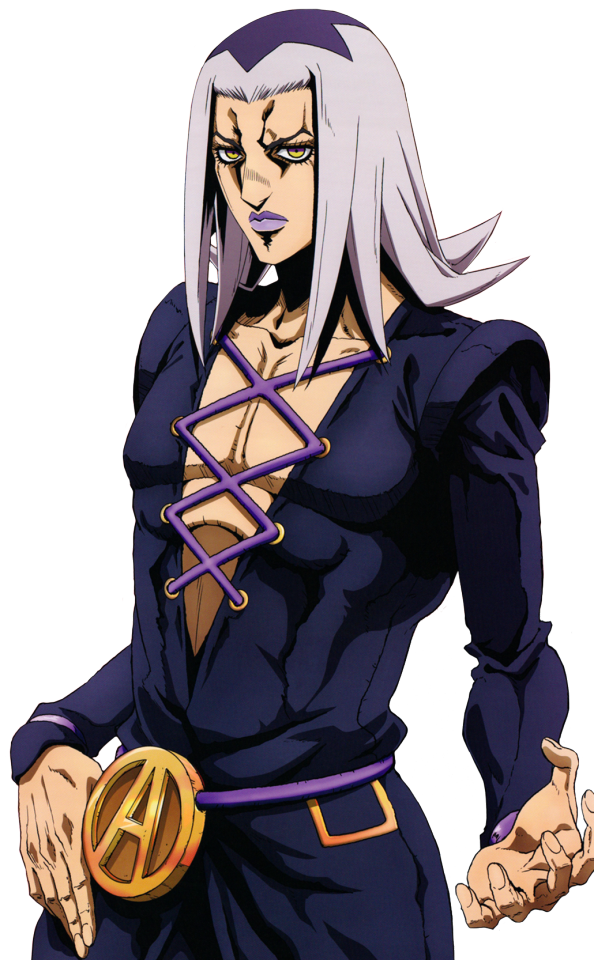
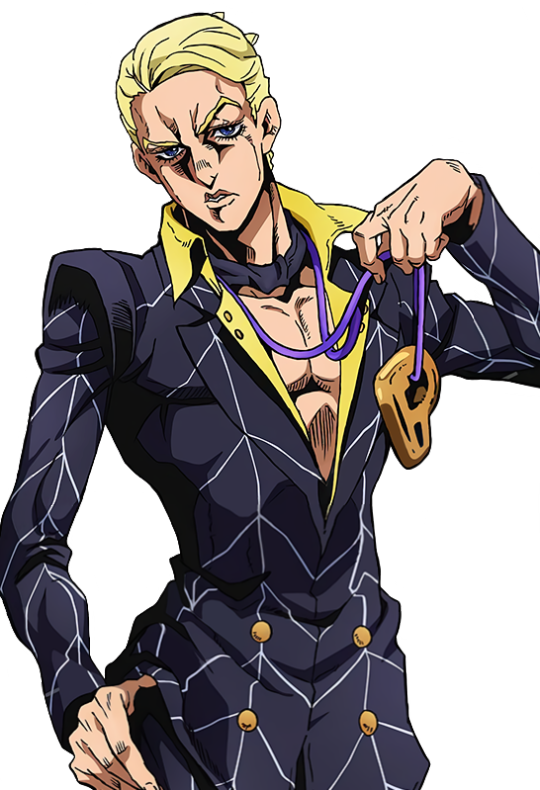
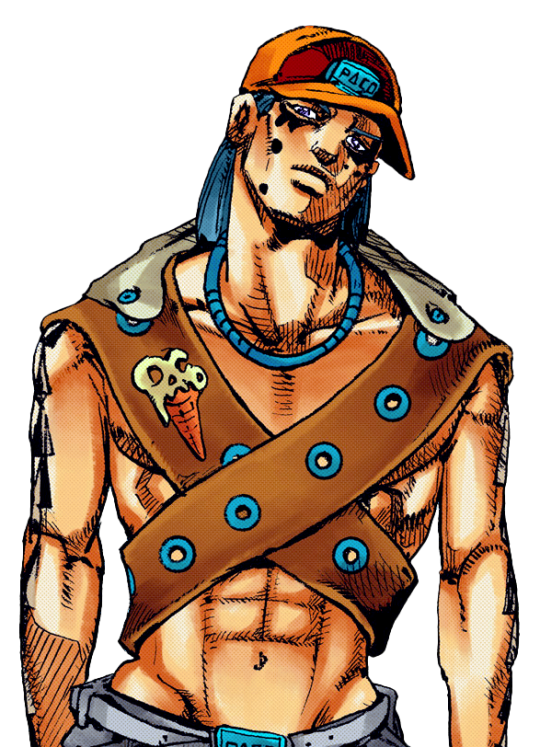
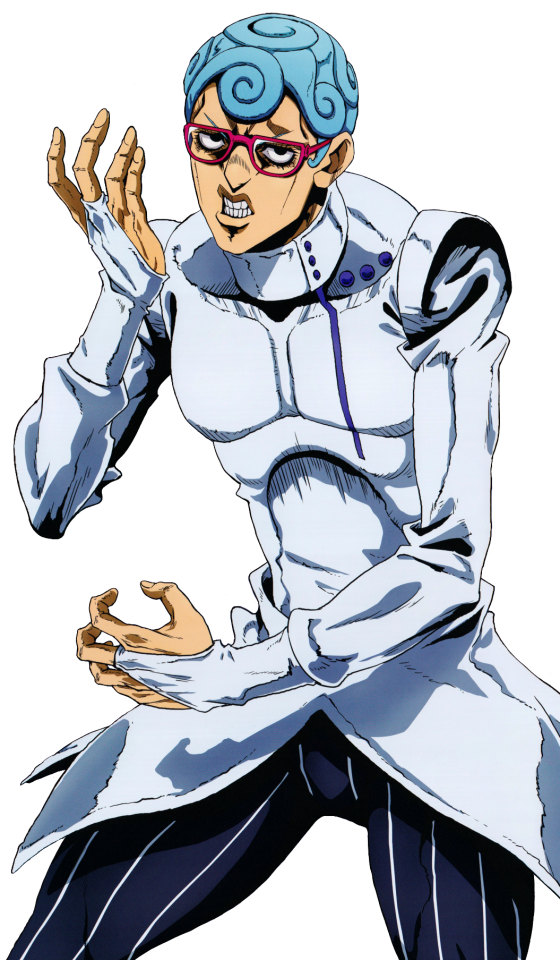
#okay theres no contest for me you cant beat abbacchio its impossible#prosciutto might come close but its the true lesbian icon leone abbacchio#also theres so many part 5 characters here in the second chances huh#im eventually going to do a statistic analysis on which parts won or lost the most#leone abbacchio#jjba prosciutto#prosciutto#paco laburantes#jjba ghiaccio#ghiaccio#vento aureo#golden wind#the jojolands#jojolands#jojo no kimyou na bouken#jjba#jojo's bizarre adventure#who's hotter jjba#hottest jjba character bracket
64 notes
·
View notes
Text
I cannot stress enough how much I appreciate JJBA's willingness to explore morally grey characters, especially as the series progresses. At the end of the day, this facet of a character is what keeps me engaged, because you have an (often) deeply flawed person doing their best to achieve their goals, protect the people they care about, and to survive. I genuinely don't think it'd have the same effect if this series was full of Perfect Heroes.
JoJo protagonists (with the exception of Jonathan but I'll discuss that in another post), are messy. Yes they're strong and brave and have a sense of justice but they're also rude, con artists, manipulative, and hurt/kill people as they see fit. And honestly? I love it. I wouldn't have them any other way. It humanizes them. It transforms characters who essentially have superhuman or even godlike abilities and makes them relatable. They struggle with guilt, regret, shame, and anger just like anyone else. They have damaging coping mechanisms. They sometimes take their frustrations out on people who don't deserve it. They're fucked up just like a regular person.
The whole point of this is creating a world where there are no true Good Guys. Everyone's hands are dirty. AND YET, in spite of all of this they still have good hearts. This series could have very easily taken a turn in the other direction and gone the nihilistic route but it doesn't. JoJo could have become a series full of nothing but characters who are only motivated for selfish reasons but it isn't. Not to be cliche, but, at it it's core JoJo is a series about love and friendship and protecting it at any cost. It understands that the connections we have with each other are stronger than any stand. That no matter how fucked up a protagonist or supporting character is they still have the potential to do good. This is a story where, at the end of the day, love will always prevail and I think that's pretty damn wonderful.
#jjba#jojo's bizarre adventure#don't mind me just in my feels after reading jojolands lmao#I've known my new crime son for all of 5 minutes and I already love him#character analysis#b talks jojo
619 notes
·
View notes
Text
Dio is the textbook definition of a sociopath
As someone who's interested in psychology, I think it's fun to analyze the mental state of fictional characters, especially villains, to understand why they commit such atrocities.
Dio is a particularly interesting case, as while I don't think he's a super complex character writing-wise, he's pretty fun to analyze psychologically.
So, while I was researching personality disorders, I noticed that Dio exhibits pretty much all the symptoms of antisocial personality disorder.

So let's go through them, shall we?
Disregard for laws and social norms;
Consistent deceitfulness, lying, or manipulation for personal gain;
Lack of empathy, guilt or remorse over harming others;
Impulsive behaviors such as substance abuse, risky sexual behavior, etc;
Hostility, aggressiveness, and frequent physical fights or assaults;
Superficial charm/charisma used to manipulate others;
According to the American Psychiatric Association, a person needs to exhibit at least three of these symptoms before age 15 to be officially diagnosed with ASPD. In Part 1, we can see that Dio exhibits most of them as young as 12 years old.

Now you might be thinking: "but it's very common for villains to have these traits, you can't just diagnose Dio based on that", and that's a fair point.
…But then I read an interview with Araki where he states:
"[...] Additionally, FBI psychological profiling was a hot topic around the time that I wrote this. Why do serial killers do what they do, scientifically speaking? I was inspired by that when I was working on Dio."

…Which leads me to believe that Araki did, in fact, research about this topic in order to write Dio.
Another interesting aspect of ASPD are the causes behind the disorder. As we all know, there's that pretty infamous scene in Phantom Blood where Speedwagon claims that Dio was born 'evil'. And what if I told you that he's half-right?

Let's look into the causes of ASPD:
First, we have the genetic factor, aka heritability, which is fairly straightforward: children of parents who suffer from ASPD have a way higher risk of developing it than children who don't; additionally, children of alcoholic parents are also at a higher risk.
And who is Dio's father? Dario Brando—an alcoholic scumbag who abused his son and wife, and was essentially responsible for her death after forcing her to work tirelessly. He was also more than ready to leave an infant to die after stealing his parents' valuables; his visible lack of empathy, alcoholism and violent behavior leads me to think that Dario himself suffers from ASPD, which he passed on to his son, Dio.

Then, we have the neurological and physiological factors; basically, there's studies that indicate that people with ASPD have decreased activity in the prefrontal cortex—the region of the brain that's responsible for emotional regulation, empathy, and impulse control.
Other studies show that imbalances in the neurotransmitter system, such as those involving serotonin and dopamine, have been associated with impulsivity, aggression, and antisocial behavior.
But there's more. It is a known fact that our environmental influences, especially during early childhood, play a crucial role in shaping our behavior. Research shows that adverse experiences such as neglect, abuse, poverty and exposure to violence in childhood can contribute to the development of ASPD.
Dio has gone through pretty much all of it as a child. Alongside growing up poor, he was physically and verbally abused by his father; I also think it's very likely that kid Dio also had to go through a fair bit of neglect after his mother's death, as we all know that Dario wasn't at all concerned in actually raising him.

So, was Dio actually born evil as Speedwagon claims? The answer is 'sort of'.
In my opinion, what happened was that Dio was born with some sociopathic tendencies (the genetic and neurophysiological factors I mentioned before) that were later exacerbated by his traumatic childhood experiences.
Of course, that isn't meant to excuse Dio's actions/behavior. He's an irredeemable monster, and that's part of why I like him so much.
32 notes
·
View notes
Text
I feel like there's a lot of fundamental misunderstandings about how hamon and vampires work in jjba, and I think that's so tragic. Hamon has gained the reputation of being just "magic sunlight karate," but it's so much more. Hamon is the energy of life, it's found in the ever rippling motion in everything. It beats in our blood, flows in the waves, shines from the sun, blooms from flowers, the air we breathe. It's intrinsically tied to motion and to life itself. Everyone and everything has hamon, its just that hamon warriors have been trained to harness it.
Jonathan's hamon abilities are so strong from the very beginning because he's so full of love and passion, all for the people and things he cared about so fiercely. What he's channeling isn't the sun, it's life itself. The most painfully symbolic part of hamon as a concept is that it's what ties all living things together. the very nature of human connection is brought from hamon.
Dio failed to ever truly connect with anyone else in life, when he kills someone to drain their blood it is like he's severing that person's love, relationships, their passion for living-- its so much more than just eating a couple prostitutes sometimes. Vampires don't feed on people just because, they drink blood to sustain their hamon. They have to leech the very essence of life, of human love and joy, to keep going because they lacked those things in life. Dio becoming a vampire is just as symbolic as it is literal.
Vampires at their core represent self-sabotaging, bitter, lonely people who refuse to let others in. The only way they can live is by killing others, severing human connection and happiness and love and destroying it with them. They don't get happier themselves, they just destroy.
Vampires are killed by the truth of human connection and passion being blasted straight into their faces. They are born from self-hatred and loneliness, a lust for the peace and happiness that escapes them, a violent urge to destroy what they struggle to obtain. To live is to love, and to be undead is to yearn.
#i like phantom blood a normal amount guys#its so important to watch and understand part 1 to understand the themes of the entire series#and i stand BY that#jjba#jojo's bizarre adventure#jojo part 1#phantom blood#hamon#vampires#jonathan joestar#dio#dio brando#will zeppeli#robert e.o. speedwagon#erina pendleton#character analysis#media analysis#anon yells about stuff
231 notes
·
View notes
Text
No but the way Pucci being Christian is so intertwined with his motives as a villain... He’s every story I’ve heard of the Christian convert who suffered something horrible and senseless, and after drifting through life lost and without a sense of purpose, found hope by believing in God. He’s so many stories of tragedy I’ve seen where people managed to cope by finding peace in the idea that this is all part of God’s divine, incomprehensible plan; It’s fate, it’s his will, and by accepting it they can move on. It’s for a reason, even if they’ll never understand what they’re looking at.
That’s what Heaven is for Pucci; His core trauma is a series of horrific coincidences with no rhyme or reason, and so he latches onto the idea that it’s all part of “his” plan, God and/or DIO’s. That’s why he finds comfort in knowing the future, knowing it’s all in the hands of Fate and removing his own blame and agency, which is why the narrator asks the viewer to judge for ourselves who did wrong, when we see the backstory of Wes, Enrico, and Perla. Pucci made a decision and it backfired horribly, so he doesn’t want to choose anymore.
It’s the way Pucci’s desire to be the messianic hero screws him over and causes tragedy; He’s so devoted to his position as a priest that rather than sabotaging it in order to just tell Perla the truth to her face (thus breaking the rules of the confessional), Pucci relies on this roundabout method so he can have it both ways, only to cause heartbreak and death. Pucci is so desperate to save humanity to make up for his own guilt and failure that he resets the universe, making him the worst kind of evil in his brother’s eyes; One totally oblivious to its nature. Pucci begs to die a martyr from Weather Report and Emporio, rather than just dying here and now.
Ungalo and Rikiel are prepared to die for Pucci once he gives them a sense of purpose to all of the inexplicable misfortune in their lives; Versus is also emboldened by this realization, but chooses to weaponize it for himself. The sons of DIO are people who all went through misfortune their whole lives, they’re ‘children of God’ who find comfort in devoting themselves to something they can actually believe in, that they believe will take care of them in some way; Like many Christians following the path of God, believing Heaven is waiting for them at the end of the tribulation and that it will all be worth it, that it all meant something and mattered and served a cause, like them.
Pucci and the sons of DIO can no longer bear the pain and uncertainty of moving forward, so they aspire, Pucci especially, for a world where fate will move things along for them. They don’t have to take the first step, especially not Pucci, when Made in Heaven’s reset will compel him and everyone else to do what’s fated, regardless of what they try.
Pucci fears and admires the courage of the Joestars who are able to step forward and face fate, engage and grapple with it, rather than just blindly accept and surrender in despair. If Diavolo precedes Pucci as someone too resistant of fate, Pucci is the opposite; Someone too resigned to it. Unlike the Joestars who know their fate but can work with what’s written in stone to change the other details.
It’s why Pucci admires the first human to try a mushroom despite knowing it could kill them; But rather than put in the effort to get up to their level, Pucci would rather everyone stoop to his own, and claims he’s just sparing people noble yet needless pain (He’s only sparing himself by avoiding the reminder that he could and should be braver than this). He says he pities the human who tried a mushroom, adding that they were probably only motivated by hunger and desperation, and had no choice anyway.
I think Pucci is secretly envious of that courage, and that’s why he always downplays it afterwards by suggesting it’s foolishness rather than bravery. Pride, Envy, Wrath... Sloth given his despair, and a bit of Greed with the $800 dollar pants. Then there’s the BDSM vibes of Whitesnake for Lust, all that’s missing is Gluttony, which I guess the cherries and being devoured by the Green Baby account for...?
In all seriousness, Pucci wants guidance; He surrenders himself to God, follows the instructions led by DIO, and relies on Fate to tell him what to do when Made in Heaven resets the universe. Remember that time Pucci got around his brother’s Heavy Weather by removing his sight, and forcing Anasui to guide him? Yeah.
There’s a reason why Whitesnake obsesses with preserving the past, and I think part of it boils down to Pucci being afraid of its counterpart the Future; Which Made in Heaven, not entirely unlike King Crimson, allows Pucci to speed through and glimpse, to get through the worst of it ASAP and lessen the pain. He doesn’t want to accept that sometimes things just… happen.
271 notes
·
View notes
Text








Bruno Bucciarati & Eren Yeager : Parallels
#aot#eren yeager#eren jaeger#bruno bucciarati#bruno buccellati#attack on titan#shingeki no kyojin#aot eren#anime#anime gif#anime edit#edit#gifs#gifset#jjba vento auero#jjba#jojo's bizarre adventure#jojo no kimyou na bouken#jojo part 5#giorno giovanna#anime analysis#character analysis#food for thought#discussion#analysis post#parallels#mikasa ackerman#levi ackerman#stone ocean#golden wind
30 notes
·
View notes
Text
If Jonathan had enough insight to find an air pocket underwater while he was about to drown I'm pretty sure he'd be observant enough to pick up on the fact that Speedwagon had the hots for him.
I know Jona is not the best at catching social cues but Speedy isn't really subtle about his feelings...
#clawz shitpost#shitpost#(sort of)#real talk i hate the unrequited love trope ESPECIALLY when applied to jonawagon#its pathetic and annoying sorry not sorry#i can't imagine that jonathan wouldn't be receptive to speedwagon's feelings#he has a big heart and lots of love to share around#character analysis#jjba#jojo's bizarre adventure#phantom blood#jonawagon#speedwagon#robert e.o. speedwagon#jonathan joestar
18 notes
·
View notes
Text
The Devil(s) of Metal Fight Beyblde.
Dr. Ziggurat, the main antagonist of Beyblade Metal Masters, shares many parallels and similarities with the Christian Devil.
He is a ruthless and manipulative executive of an enterprise called Hades Inc., who enjoys making "deals" with other people. Note that Hades and Hell were interchangeably used in Greek mythology to describe the afterlife. The deals he makes are almost like demonic contracts: Zeo had to become a lab rat to save Toby, losing his sanity in the process. Ziggurat takes advantage of desperate people like Zeo and even Julian.
Ziggurat transformed Toby into Faust, whose name comes from the main character of a German legend. Faust, inspired by Johann Georg Faust, made a contract with the devil: Mephistopheles would serve him, and after a certain number of years, the devil would take his soul. Faust sacrificed his soul either to gain knowledge or for material and personal gain, depending on the version. Toby accepted the arrangement against his will, and even if he was cured, he lost himself in the process. He can play Beyblade again, but as Faust, he is only a soulless tool.
The doctor himself seems to have "sold his soul," since he doesn't care about ethics or the fact that he is using children for his experiments. Hikaru explicitly said that some of the bladers incompatible with the arrangement system were so impacted by it that they had to end their careers.
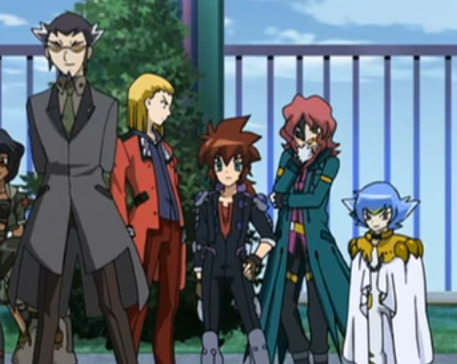
Physically, Ziggurat appears taller than most of the cast, though this is because they are all children. He has spikes of hair at the back of his head, like Damian, that emulate horns. He also wears a dark gray suit, which contrasts sharply with all the colorful characters (even his collaborators, Daidoji and Pluto, seem more colorful than him). He is as gray and dark as the hellish world Damian creates with his Kerbecs.
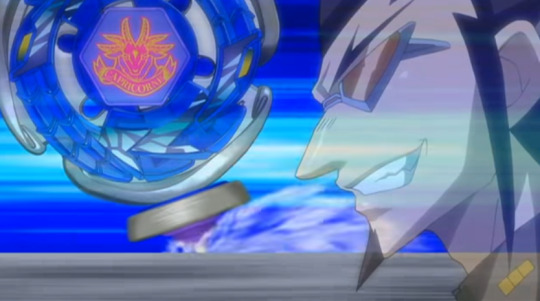
His name comes from ancient structures called ziggurats, built by the Mesopotamians for cult practices. Daidoji's name means (literally) "great road/way to the temple". They were both part of the Hades cult, lead by Pluto who lived in a temple. However, Ziggurat can also be a reference to the German word "Ziege," which means goat. Ziggurat's design also emulates the animal, with his goatee and spiky hair. His Beyblade is Spiral Capricorn, and in the anime, its Bey beast is often depicted as a simple goat.
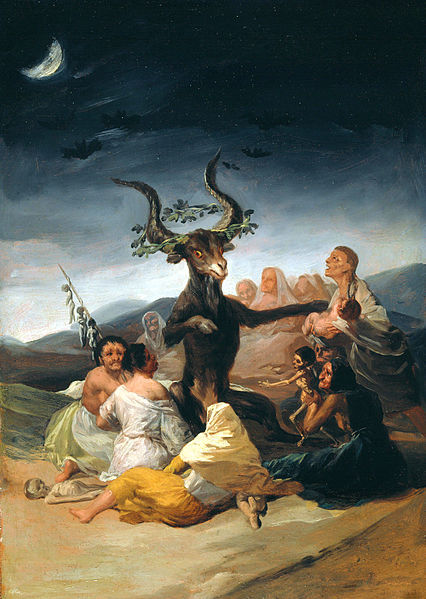
This animal is often tied to the Devil and is one of the forms it takes. The painter Goya depicted a gathering of witches with "Witches' Sabbath" (Goya, 1798), where the Devil takes the form of a goat and is offered children to eat. While the doctor doesn't (seem to) eat children, he effectively despises them and shows a lot of disdain towards them. He also steals their innocence in a way. Zeo and Toby do not take back their Aries Bey; they now use Beys with the Spiral fusion wheel, reminiscent of Spiral Capricorn. Aries is a sheep and is typically associated with innocence. They cannot go back to who they were; they are permanently scarred by what they have been through during their time in Haves Inc.
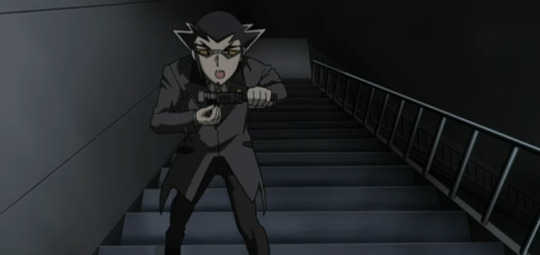
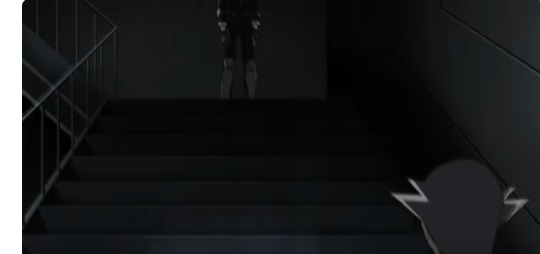
In the scene where Zeo is stopping Ziggurat, he is at the bottom of the stairs, symbolizing a shift in power dynamics between them. This positioning could also symbolize Zeo casting Ziggurat back to Hell, as Hell is below the Earth in popular culture.
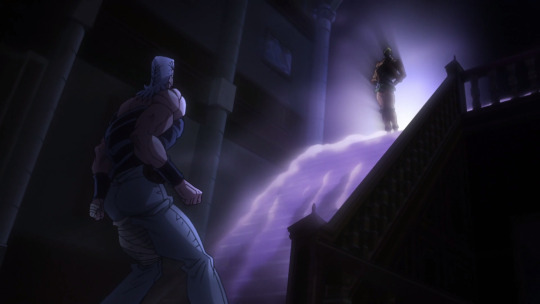
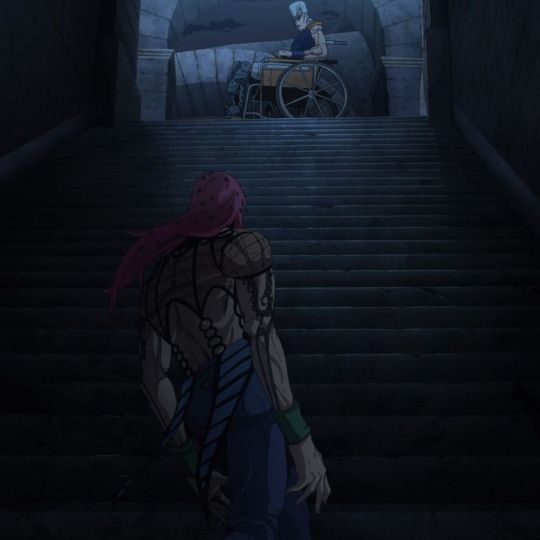
"JoJo's Bizarre Adventure" has previously utilized its antagonists, DIO (assimilated to God) and Diavolo (a mafia boss, assimilated to the devil), in a similar manner. DIO is upstairs (heaven), while Diavolo is at the bottom of the stairs (hell). I would add that in the Metal Saga, it is common for villains to fall: Nemesis and Daidoji fell into a pit, and Hades City fell into the abyss of the sea.
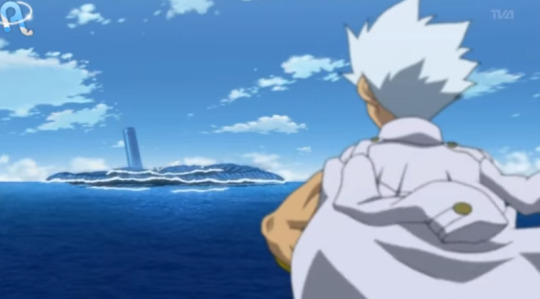

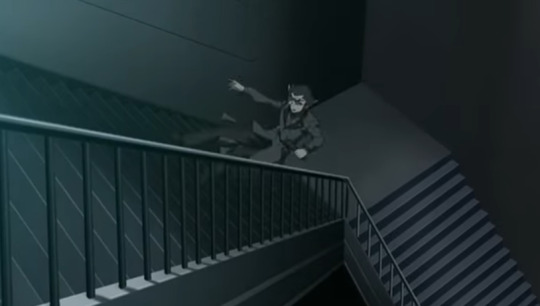
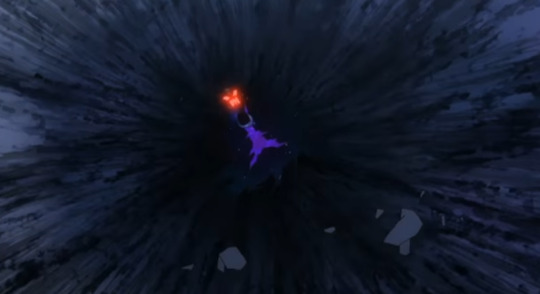
These falls can be interpreted as both a physical defeat and a symbolic triumph over an evil that is cast back into hell.
Ziggurat is a more traditional version of the devil who makes deals with people and manipulates them, while Nemesis embodies the devil of the apocalypse, wishing for total chaos.
#mfb#metal fight beyblade#metal fury#zeo abyss#character analysis#julian konzern#toby beyblade#daidoji#doji beyblade#pluto beyblade#nemesis beyblade#jojo no kimyou na bouken#jjba diavolo#dio jjba#damian hart#dr ziggurat#ziggurat beyblade
28 notes
·
View notes
Text
A "Brief" Analysis of Religion and Johnny Joestar
Introduction
I would be remiss not to begin by addressing Stone Ocean. I believe SO was where Araki really began playing with the idea of faith. Enrico Pucci is a priest, and his outfit is emblazoned with a giant cross. While there is something to be said about Pucci's repurposing of religion to suit his own goals (there are several good discussions of Pucci's character with relation to his faith that others have made, though I don't have them on hand), for my purposes there are only two aspects of Pucci's connection to Christianity that are relevant here:
a) His actual religious faith is somewhat disingenuous (Pucci listens to Dio's Heaven Plan because it serves his own aims - like Hot Pants)
b) He belongs to organized religion (introduced in a church, works in a prison chapel, 'Father' Pucci)
And one aspect of his character that is relevant:
a) He fully believed the Heaven Plan was righteous and would be a boon to humanity
Given that Pucci is the villain of the part, I think it's safe to say that we are supposed to take away that all of these are negative qualities.
I bring this up specifically to juxtapose SO's depiction of Christianity to SBR's. Steel Ball Run is a natural evolution of Stone Ocean's religious theming that represents both a critique and affirmation of faith. This analysis will focus on the character I think best represents SBR's religious themes: Johnny.
Unlike Pucci, Johnny's faith isn't immediately obvious. He wears no crosses and, if it weren't for his own narration, we likely wouldn't know he was religious. After all, Jesus appears to multiple people throughout the part, not just Johnny. It is possible to reduce Jesus' manifestation to simply being the work of corpse parts, but working in tandem with Johnny's character, it becomes plain there's stronger themes about Christianity and religion at work in the narrative.
(It's also very telling when even ten years later (as seen in Jojolion Chapter 22: Morioh, Year 1901) one of the few panels we get of Johnny is him in prayer.)
Johnny's character is extremely rich, but for this analysis I'll choose one of the more prominent overarching themes for his arc: the search for forgiveness. The concept has another name too - redemption. I'll be using them interchangeably.
Section I - An introduction to Johnny Joestar
I'll start with a quick rundown of Johnny's backstory.
Here's a few panels to representative of George's parenting:


And here's a few of Nicholas. After several panels of darkness, from Johnny's POV we're given this:

Johnny admires him greatly, but already feels a great sense of inferiority toward him.
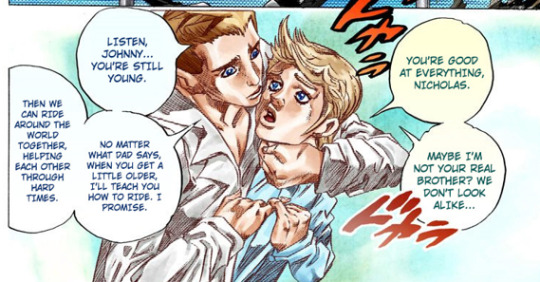
"Maybe I'm not your real brother?" Gee, I wonder who put that in his head.
Here's what we learn about the Joestar family:
(a) George Joestar is a Grade-A asshole. This will be a running theme.
And (b) Nicholas was everything to Johnny.
I want to point out this panel:
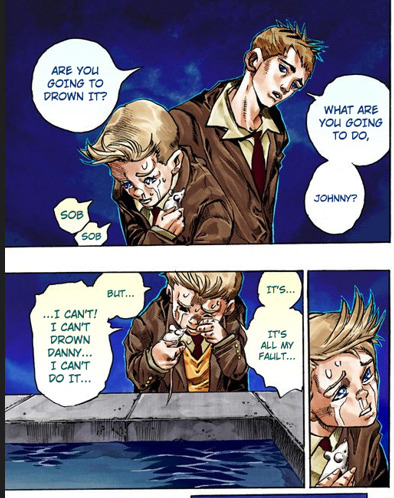
Even with George essentially physically threatening him to kill his pet, Johnny's kindness still wins out. His kindness toward animals is a consistent trait and also functions as indicator that, at some point in the past, he was far less aloof than he is in SBR. As readers, we find out this is because of Nicholas' death, which Johnny believes himself to be responsible for.
Johnny's perception of his own guilt in the accident is not helped by George's constant criticizing and reinforcement of Nicholas' amazingness:
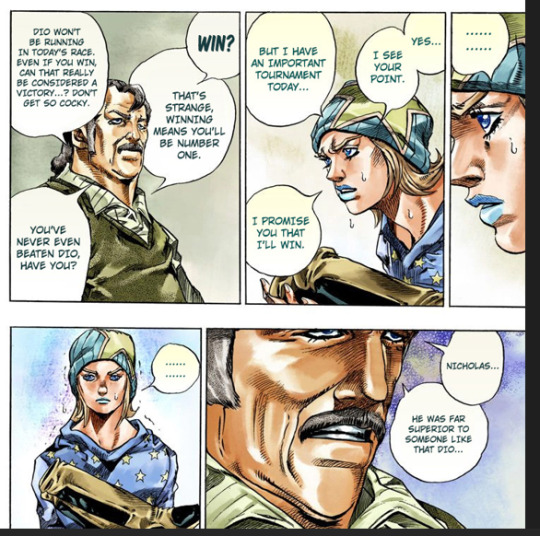
It is made abundantly clear that Johnny isn't good enough for George.
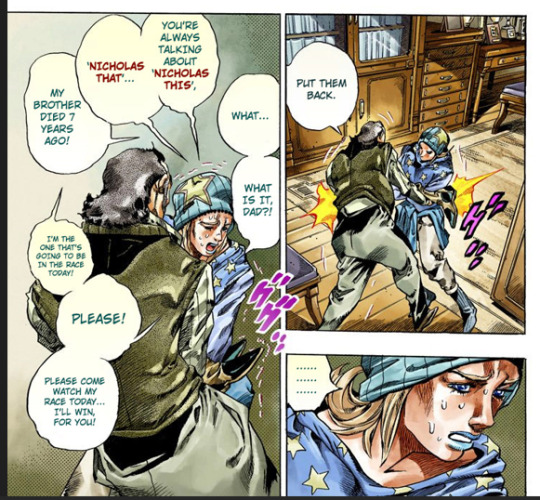
And Johnny never will be good enough. He's already the youngest person to ever win the Kentucky Derby (one of the qualifying races for the Triple Crown, which it's previously stated his father won several times) but George doesn't care. You can explain this with grief, but it seems clear that Johnny was always the unfavorite. Nicholas' death just cemented things.
The death of his brother and his relationship with George severely damaged Johnny's beliefs about himself.
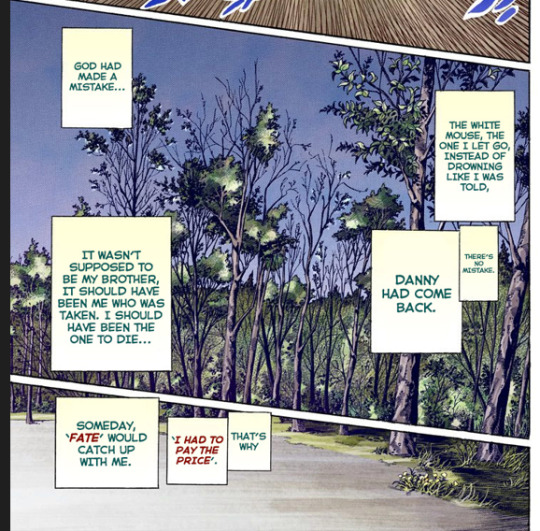
Chapter 42: A Silent Way (Part 2)
From a very young age, Nicholas' death caused Johnny to perceive himself as a murderer, willing or not. In other words, he has almost always considered himself a sinner. The 'sin' he committed of killing his brother is why he believes he is undeserving of happiness (Cain and Abel anyone?).
Because he is a 'sinner' - an unforgivable sinner - Johnny cannot fathom his life through any other mechanism but karma. He will always deserve the awful things that happened to him, because his sin is too great to forgive. God just hasn't noticed his mistake yet.
Section II - Broader themes in SBR
These are two main themes I will discuss here:
Individualism
2. Religion
My discussion on individualism in SBR will be limited to its connection to the religious theming. If you want a more in-depth look at this theme in general, check out this video.
As noted above, in Stone Ocean Father Pucci was a member of organized religion. Yet his faith was not truly in the church, but in the 'Heaven Plan', the completion of which would enable people to know their fate. They could not deviate from their set course, but the intention was that they would be able to find 'peace of mind' in that idea. This is how things are supposed to be.
We can also look at the Heaven Plan through the lens of "God has a plan for you". No matter what struggles you endure, you are supposed to be able to find comfort in the idea that some unknowable thing has it all taken care of. Is it a trial of your character? A test of your faith? If you accept God has a plan, then no matter what happens you can be assured you made the right decision (and alleviate your guilty conscience). If you live your life according to the Bible, then you have nothing to fear. If your life sucked in particular, then don't worry, because Heaven's waiting. Faith is based on the idea of "hope". That's what a prayer is - hope that someone is listening.
These ideas of religion and God's plan (i.e. fate) are also present in SBR, in a more subtle capacity. Most obviously, we have the corpse parts. The corpse is understood to be an object of power and value by most everyone in the story.
Here are a few panels of how different characters perceive the corpse.
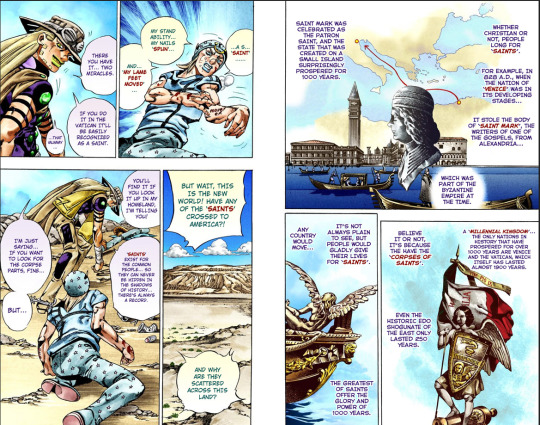
Chapter 27: Tusk (Part 3)
Gyro understand the corpse in the capacity of its ability to grant power and glory to the nations of the world. Still, he acknowledges "saints exist for the common people".

Chapter 57: Civil War (Part 2)
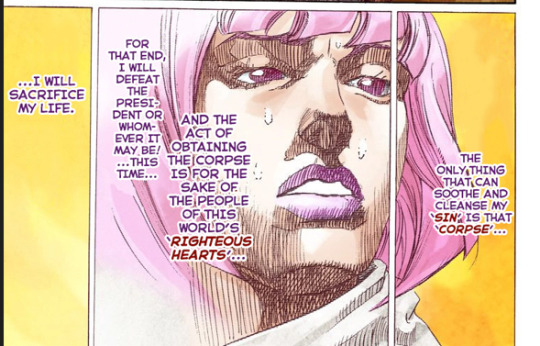
Chapter 75: D4C (Part 8)
Hot Pants initially seems to have a similar impression of the corpse as Gyro. However, as the story progresses, we learn that they and Johnny's motivations to collect the corpse are quite similar. The difference is that while HP wants the corpse for themselves (to earn forgiveness), they believe they can accomplish this forgiveness by giving the corpse to a higher cause (the Vatican). Hot Pants, too, acknowledges that the miracle of the corpse is supposed to belong to the people.
Meanwhile, Valentine uses the corpse as proof of the 'napkin law'. Whoever has the corpse will have the power to influence the rest of the world. This is representative of religion as an influencer and indication of power.
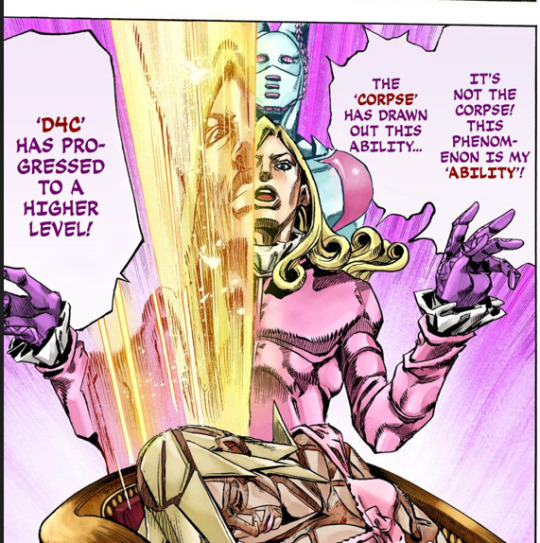
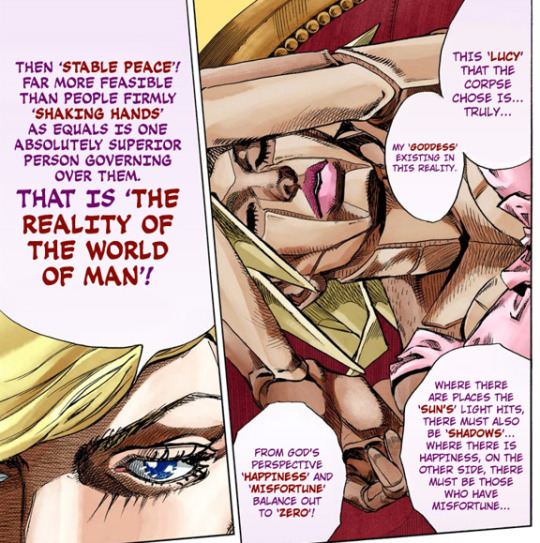

Chapter 78: D4C (Part 11)
Valentine quite literally claims the power of the corpse - the power to control the right to good fortune, to decide who deserves good things and who doesn't - as his own. He even decides this power doesn't belong to the corpse, but was his all along, his own potential just waiting to be drawn out. He compares this new ability to that of God himself. Valentine is putting himself in the position of God.
All of these characters consider the corpse in terms of what it means to a larger cause. The corpse, and thus religion, is a tool to grant power to those who possess it. It enables whatever entity possessing it to impose "God's plan" (I use that liberally) onto others, supposedly for their own good. Even HP, who has the motivation closest to Johnny's own (even mirroring his 'any means necessary' approach), still views the corpse in terms of its wider applicability. These viewpoints are starkly contrasted by Johnny's own; he just wants the corpse to be able to walk again. Johnny's motivation is very base, but out of the everyone in the cast, it is the humblest and I would argue the most sincere. It's a wish that would affect only himself. The corpse - and thus religion - is something deeply personal to him.
This relatively deterministic stance on religion - as a power related to fate and a tool to control the fates of others - would be in strong contrast with SBR's individualistic themes, were it not for Johnny.
Section III - Understanding Johnny's Search for Redemption
Now I will take a moment to address the unfortunate elephant in the room, namely Araki's treatment of Johnny's disability as a metaphor. I'm not happy with it, and I think magically healing his injury was kind of bullshit when the narrative had reached a point and almost spelled out that it wasn't necessary, but it is what it is so I'll be discussing his disability in this essay in that capacity.
On a related note, I’ll say something kind of controversial: Johnny’s hunt for the corpse was never really about his legs, though that was certainly part of it. As discussed in my Civil War analysis, the parallels between HP and Johnny reveal something else: narratively, gathering the corpse is shortcut to characters earning forgiveness. I’m not sure Johnny himself realized it before Philadelphia, but at some point the corpse became less about his disability and more about spiritual redemption. Healing his legs is representative of cleansing himself from his 'original sin' of "killing" Nicholas.
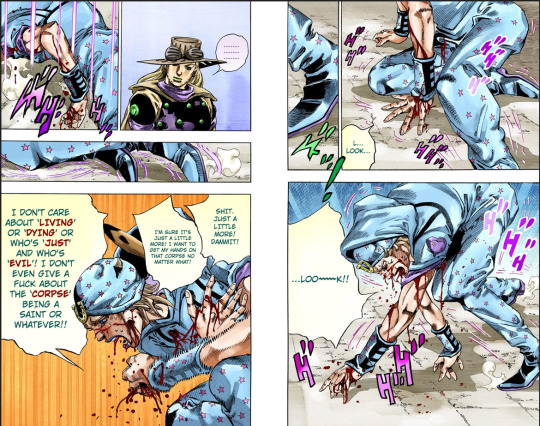
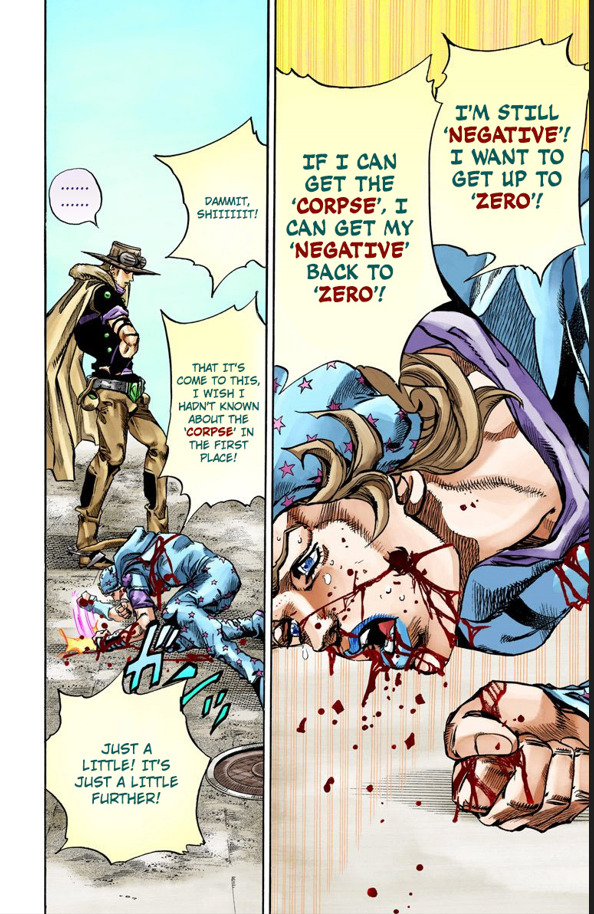
Chapter 72: Ticket to Ride (Part 2)
Johnny perceives his shooting as the ultimate payment for Nicholas' death. He ran from George after their falling out, pretending he was living the good life without actually forming genuine relationships with anyone. He ran from the guilt he felt toward Nicholas' death for even longer, only recently truly facing his trauma in the Civil War arc. His disability prevented him from being able to run away anymore and forced him into further isolation. It was the final proof he needed that he is someone not allowed to be happy - not allowed to be forgiven. As he is, he's not worth anything to anyone. That's why he's so desperate to walk again. Johnny has been in the 'negative' his entire life. The corpse granting him mobility would be the ultimate proof that he is a person worth healing / saving.
I'll also suggest that his statement of "not giving a fuck if the corpse is a saint or whatever" is less how he feels about religion and moreso about the apparent reverence everyone around him has for it, namely Hot Pants, Valentine and even Gyro. They all believe the corpse to be something valuable because of what it means to a larger cause or organization. For Johnny, it's a means to an end. At this point in the story, it's become clear that the one thing Johnny wants most of all is to be forgiven for his 'sin' - a chance to wipe the slate clean.
Section IV - Johnny and Faith
Firstly, Johnny was raised in a religious household. As seen above, his father is obviously religious to some extent, and when Gyro initially questions him about the corpse he's able to list off a few Saints.
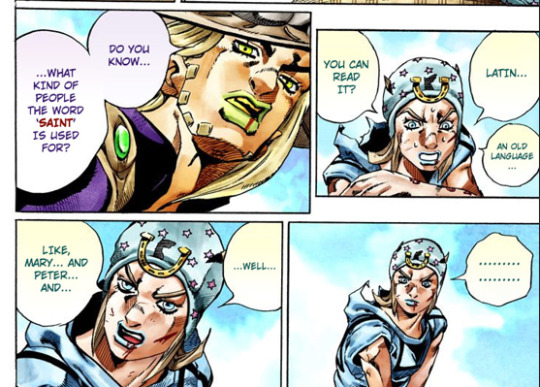
Chapter 27: Tusk (Part 3)
At the same time, however, I believe there's enough evidence to suggest he's in a crisis of faith. As per evidence I'll show later, he may simply think God has abandoned him like everyone else.
I'll move on to Johnny's perception of himself and how that relates to the religious themes in the story.
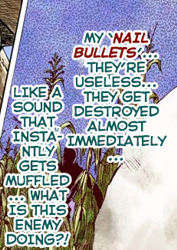
Chapter 41: A Silent Way (Part 1)
Stands are reflective of their user's fighting spirit, or, more literally, their soul. Tusk's bullets being destroyed so quickly is reflective of the weight of Johnny's guilt against his goal of forgiveness. At this point, Tusk is still in Act 1. Johnny feels any progress he makes towards forgiveness simply... fizzles out. Forgiveness means he can be happy, but he can never be truly happy because he has always been a sinner.

The dinosaurs here function as a metaphor for Johnny's guilt (isn't that a sentence?). He was able to start down the road to forgiveness through the hunt for the corpse parts and gaining Tusk, but at this point he still doesn't feel like he's truly earned the right to have them. 'Fate' will catch up with him before he can be forgiven, because he doesn't deserve to be forgiven.
Contrary to popular readings, as much as Johnny appears rather cold most of the time, he's actually an extremely caring person. His kindness with Danny backfired on him in a big way, which I why I think he tries to shut down the softer part of himself so hard, but it still comes through. We can see it in his loyalty to Gyro, putting up with his jokes and even playing along, as well as putting his life on the line to protect him several times when the easier option would have been to run away. He feeds the stray wolf in Wrecking Ball because he felt bad for it. He's also one of the only people to be genuinely kind to Lucy, even defending her to Gyro and protesting her involvement in the corpse hunt. Think about that - Johnny, Mr. "Get the Corpse at any cost" Joestar, was obviously willing to put Lucy's safety before his determination to get the corpse. Much of his coldness can be attributed to walls he built due to those he cares about frequently abandoning him, voluntarily or otherwise.

Chapter 42: A Silent Way (Part 2)
And if everyone has abandoned Johnny - because he has never been worth anything, because he is a sinner - then God surely has too. Very early in his life, he closed himself off to other people (and we can infer, by extension, closed himself off to God).
Because of this - because of his lack of connections to others, because of his low self-worth, because he feels he isn't someone who deserves happiness - Johnny's conviction to collect the corpse parts frequently wavers.
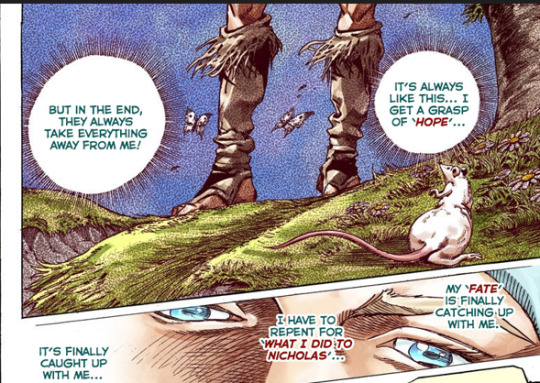
Chapter 44: A Silent Way (Part 5)
His 'dark determination', first seen in True Man's World, demonstrates that he does have the motivation to collect the corpse parts at any cost. At the same time, A Silent Way highlights his tendency to give up on himself. That's the struggle he must overcome in that arc. Johnny must harden his resolve, because despite still feeling like he doesn't deserve anything, he does want the corpse parts so that he can be someone worth something - to Gyro, at the very least. And because of his strengthening bond with Gyro, Johnny finds the resolve to fight on not just for Gyro, but for himself as well, evolving Tusk into Act 2. Even so, at the end of this arc, Johnny is still wavering. His still isn't sure of his worth because he has yet to pay for his 'sin'. Deep down, he believes he is not and never will be worth forgiveness.
But he keeps trying.
Johnny is the first to explicitly recognize the corpse as Jesus Christ, and Johnny is the only one to whom Jesus speaks directly and addresses by name.


Chapter 58: Civil War (Part 3)
As discussed in my Civil War analysis, his connection to Jesus, and Christ's words to him, are critical in Johnny realizing that Nicholas' death was not his fault. At the end of the arc, Johnny is purified, because Nicholas' death was never his sin to bear. Furthermore, despite threatening it several times, Johnny has never murdered in cold blood. Each and every time was self-defense against Valentine's minions (ironically, Gyro probably has a higher kill count.) When Axl Ro kills Johnny, his old self quite literally dies, and he is reborn purified of past sins (hey, that's a familiar story).
What we learn here is that it was the one man who was collecting the corpse - again, representative of a shortcut to forgiveness - for his 'selfish' goal of spiritual redemption that Christ deemed worthy of showing himself too. By reading Civil War as Johnny reconnecting with his faith through finding forgiveness for his sins in both himself and Christ, we understand that he isn't wavering anymore - now, he does believe himself someone worthy of redemption. But even with his faith in God and Christ solidified, Johnny still believes he hasn't been completely forgiven, as his legs are still not healed. Hence why he fights so desperately to reclaim the corpse in the D4C arc.
Section V - The Two Sides of Religion
First, the corpse siding with Valentine causes Johnny to have another crisis of faith.
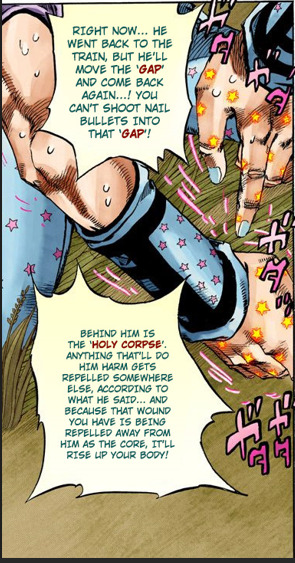
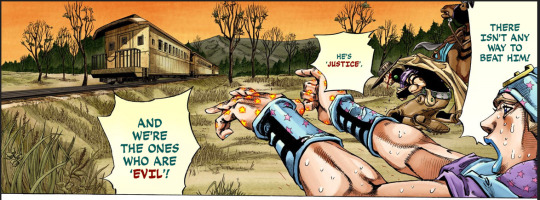
Chapter 79: D4C (Part 12)
Valentine and Johnny's stances on faith are opposed to one another throughout the final confrontation. Valentine is trying to impose his version of "righteousness" onto the world. Valentine believes that, through the corpse (religion), he has the right to decide who is worthy and who is not. Johnny, by contrast, is fighting to save Lucy and reclaim the corpse - to make himself someone 'worth something' again. Yet we see that even Johnny isn't completely sure of that his path is the 'righteous' one. Does someone like him (someone still unworthy, a sinner) even have the right to oppose Valentine's vision? Is he worthy of forgiveness?
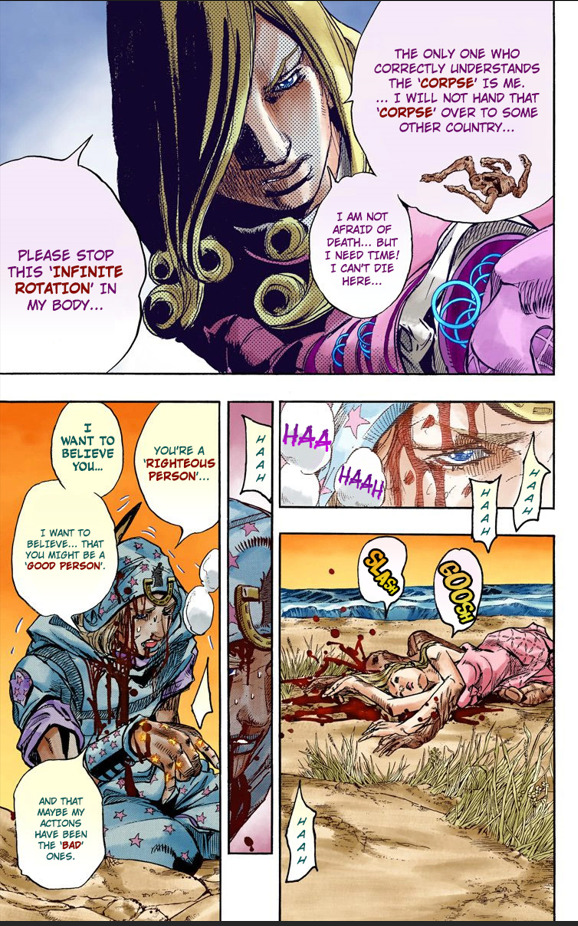
Chapter 88: Break My Heart, Break Your Heart (Part 1) - quick side note: notice how Johnny still has very low self-worth and continues to condemn himself as a 'sinner' (someone evil) frequently and without much cause. Even after Valentine literally killed his best friend, Johnny struggles to see himself as someone who even at the bare minimum deserves to judge others. George Joestar when I get you...
Valentine assumes a similar role to Pucci. In this final confrontation, he is representative of the use of religion as a tool of power.
Quick aside here:
The comparison of those involved in the race to a lamb - famously associated with Jesus Christ himself - is curious.

Chapter 85: Ball Breaker (Part 3)
Valentine indirectly refers to Johnny as his 'greatest challenge' and moreover attempts to force him to attack first (Chapter 85: Ball Breaker (Part 3)). Valentine is trying to force Johnny to become a sinner again before he condemns him to death for being unworthy of Valentine's 'righteous' world. Valentine is literally acting in God's place as judge, jury and executioner by determining who is 'worthy' and 'unworthy'.
Johnny, on the other hand, is representative of religion as a healing influence. He doesn't want to influence large groups of people or protect any nation. His connection to God and Christ through his faith is far more individualistic and personal. I think it's very telling that he's the winner here.
Section VI - Conclusion
At the end of SBR, we learn that despite everything - even through his crisis of faith - still, Johnny prays. He's always been praying.

Chapter 95: The World of Stars and Stripes
The story of Steel Ball Run is about finding your faith again. Johnny always prayed, even when he thought he’d never be forgiven, even when he believed God wasn’t listening. He is the kind of person that miracles are for (as alluded to by Gyro and Hot Pants in Section II). Johnny is the only religious character to escape the narrative unscathed, largely because religion was something so deeply personal to him. Rather than simply being 'selfish', his goal was personal, spiritual redemption. Faith carried him across the continent, helped him overcome his trauma, helped him connect with Gyro, and showed him how to find self-worth again after his lowest point. His faith was sincere and for himself, in contrast to most everyone else in the story who tried to impose their beliefs onto others.
Hot Pants, a member of organized religion, used it as a means to an end but never found the forgiveness they were looking for because their faith was performative. Pucci too failed because he used his faith (in the Heaven Plan) to try and assume control of the fate of others (similar to Valentine).
In contrast to Pucci and Valentine, Johnny absolutely wavered in his faith. Several times, in fact. He believed for most of his life that no one, least of all God, was listening. God had no plan for him, because his life was a mistake. Even so, he found comfort in praying for himself and Gyro, and by the end at last believed himself someone worth forgiving. And he was forgiven - cleansed, if you will. His being able to walk at the end of SBR is indicative that he no longer considers himself a sinner, but someone worthy of a new beginning as a person.
By the end of SBR, it’s apparent that the corpse itself isn’t what Johnny needed. It was because of his relationship with Gyro and the trials they faced together that he was able to gain a better understanding of himself, where he fucked up in the past, and learned how to be a better person. Lesson 5 is the key. "The detour was the shortest past." (Chapter 84: Ball Breaker (Part 2)) Johnny never fully possessed the corpse, preventing him from using it as a shortcut to redemption. It wasn't the corpse, but the corpse hunt itself that enabled Johnny to find forgiveness in himself and reconnect with his faith.
Narratively, Hot Pants, Valentine and Pucci were punished because they were not sincere in their proclaimed beliefs or otherwise abused religion in a position of power. Yet religion itself still isn't represented as a negative thing. Johnny's character carefully combines themes of individualism and religion to demonstrate the healing influence of personal faith.
Closing Notes
This essay was a much bigger undertaking than my previous analyses, primarily because I feel I am not the person to be writing it. I wasn't raised particularly religious (I barely know the cliff notes of Christianity), but at the very least I hope this is valuable jumping off point for others.
I apologize if I repeated myself too much. This was a very messy essay and I tried to clean it up a bit, but I'm sure I missed some things.
Based on some brief scanning of different Christian denominations and what occurs in SBR, I'd say Johnny was probably raised Lutheran. What do you guys think?
Also, shoutout to Johnny’s little devil horns.
Thank you for reading! Please feel free to share your thoughts as well.
#johnny joestar#steel ball run#sbr#sbr analysis#funny valentine#hot pants#jojo's bizarre adventure#jjba#jjba part 7#jojo's bizarre adventure part 7#wow this was a lot#i love u johnny joestar...#my posts#johnny joestar character analysis#hopefully my last sbr analysis... yippee!#ofc this is only one aspect of johnny's character but i feel it's one often overlooked#when it's almost critically important to understanding him#steel ball run analysis
33 notes
·
View notes
Text
My take on Diavolo's backstory according to the manga
"Is Diavolo the devil himself, possessing Doppio? Or is it a did/mpd situation?"






"Her heart contained darkness" could be a way to say that Diavolo's mother definitely wasn't a good person and there was evil in her heart. Darkness is often used in Scripture as a symbol of sin and its effects. She could totally be an abuser if we ALSO look at Polnareff's specific example "The minds of Billy Milligan". I've looked it up, and you know who also had a severe story of abuse during his childhood, which caused the Dissociative Identity Disorder? Billy ✨


Some additional thoughts in relation to a song I think fits him very much (Also included in the playlist I made for him)
Was listening to Stratovolcano Mouth by Chiodos because I remembered about an old piece I painted to vent, and the emotions that song revives really drag me to Diavolo's past: an incontrollable amount of anger and fear, perfectly mixed, resulting into exploding like a volcano and leading him to physically destroy everything that was hurting him, including his self representation. Diavolo died in that fire he set himself. He was done with the pain he experienced and love wasn't the salvation he needed. I'm sure he felt something for Donatella, but his negative mindset poisoned by fear only made it look like a promise for even more pain in the future. She was the only one that truly loved him, but what does Diavolo know about love?
#mothtalks#character analysis#diavolo jojo#jjba diavolo#Diavolo#vinegar doppio#jjba vento auero#vento aureo#jjba golden wind#golden wind#Jjba#jojos bizarre adventure#Spotify
34 notes
·
View notes
Text
Ok, over the next couple of days, I will be disecting my favorite vampires because I dont talk about them enough.
Today, I shall discuss bisexual icon, Dio Brando.
Dio gets 9/10 and 7/10 on the Vampire Value scale for parts 1 and 3, respectively.
Dio is perhaps the most important single character in JoJo until the timeline reset. He sets off the series of events that lead to the bond between Speedwagon and Jonathan, which then sets off the Pillar Men story, then he comes back for part 3, Jotaro is kinda in part 4, and then his son is the main protag of part 5 a f then his gay boyfriend ends the fucking universe in part 6. So... you know... kind of a big deal.
The reason I gave Dio two ratings is because i feel the vampiric qualities of Dio play an inherently lesser role in part 3 than they do in 1.
Dio, in Part 1, is adopted by the Joestars through a deal struck by Johnathan's father and Dio's father. Dio then actively goes out of his way to make Jonathan's as miserable as possible while trying to find a way to covertly poison Mr. Joestar and inherit the family fortune.
Dio's character is fueled by the feeling that he'd been cheated out of life by being born poor and, as such, deserves everything he could ever dream of. Unfortunately, the universe seems to agree and provides him with the power required to do whatever he pleases. His vampirism is not an infliction, a price for his power, it IS his enabler, letting him seize anything he wishes, command any who follow him, and consume those who he see fit, and also eye lasers which he never uses again for some fucking reason. 9/10. Almost perfect vampire.
Part 3 Dio has all of these qualities, but he's the villain, rarely the antagonist. Part 3 is about mind ghosts that only people with other mind ghosts can see except when that rule is broken multiple times. Dio's real character aspect through the series before the finale is fear. Dio has scared the strongest stand users in the world into his submission due to his own stand, The World.
Dio's vampirism plays less of a role in Part 3 due to the fact that it's not his main enabler anymore. Dio is, of course, still undeniably a vampire, and is ultimately melted in the sunlight after being split in half and transfused into a 70 year old man.
The reason I give Dio a lower Vampire Value, despite the fact that he dies like a vampires, dines like a vampire, and has [word that starts with d] like a vampire, it feels less important to the plot. Dio in part 1 was warping and twisting the valiant soldiers he came across into zombies fuelled by hatred, whereas Dio in part 3 is but assembling a group of powerful people in his name. Still good vampire, but not as good as he's been. 7/10.
Anyways this has been me ranting about the hottest anime character for approximately a foot of your feed (.305m)
I will take suggestions for other fiction vampires! Send em in! I'll do my reasearch! I do have a couple more in mind though, and will probably do those first. Maybe this becomes a normal thing? Who knows. Not me. (I never lost control)
Okie thank you :))))
#writing#analysis#character analysis#vampire#dio brando#jojo's bizarre adventure#jjba#vampire value scaling system ranges from Nosferatu as seen in that one spongebob episode to Castlevania Dracula
7 notes
·
View notes
Text
I’m so tired of people not being able to treat Giorno’s character with any degree of nuance. Why are the only options either “he’s the perfect golden child who’s never done anything wrong ever and he’s my little baby uwu” or “Giorno is a monster who ruthlessly uses everyone around him for his own personal gain and he doesn’t actually care about anyone”?
Like I’ve seen so many bad takes that start off looking like they’ll be an interesting discussion of his character because they correctly point out that Giorno is definitely flawed but then they take a sharp turn into “Giorno purposefully killed everyone around him for his own personal gain.” There has to be a middle ground here. Giorno can be blinded by his ambition while also caring for his friends and their loss can deeply affect him. Those two things aren’t mutually exclusive.
I think that sometimes we forget that while yes, he’s Dio’s son, he’s also Jonathan’s. Yes, it’s impossible to deny that Giorno inherited some qualities from Dio. His charisma, his intelligence, his drive and passion to achieve his goals, but I think it’s also fair to say that he also has some of Jonathan’s qualities. There’s a gentleness to his character that just flies in direct opposition to who Dio was as a person and to me, that’s what it means to have the heart of a Joestar. I’m sorry but viewing Giorno through lens of pure Machiavellianism feels really pessimistic and like it goes against the spirit of the series and I just have no interest in it.
#jjba#giorno gionvana#b talks jojo#character analysis#sorry to have an ‘old man yells at cloud’ moment but I’m just tired#as always there’s room for everyone to come to their own conclusions and develop their own interpretations#these are just my thoughts
523 notes
·
View notes
Text
Ok people saying that Jotaro doesn’t care for Jolyne did not watch the same series that I did…
Jotaro obviously cares a lot about Jolyne and his (nameless, CMON ARAKI 😭) ex- wife. He just left them because he didn’t know how to communicate to them that there was a powerful superbeing stuck inside him and that no matter where he went trouble was going to follow him.
{edit} Another angle to add to this: Jotaro probably didnt see himself as deserving of a normal life and family- he found happiness in his wife and daughter but knew the looming threat of enemy stand users would eventually bring harm to his precious family.
Just like Holly, who he didn’t know how to protect other than putting himself in a jail cell, he ran away to protect the two women he loved.
And you’re thinking: ok, so why did he go to Japan? Well; he knew Josuke was a stand user. He knew that he was connected to Joseph, and felt more equipped to handle a situation that didn’t involve regular people like his wife and his (then stand-less) daughter.
Jotaro isn’t very good with words. He’s not the best communicator, something he never really grows out of. So the only way he can protect the people he loves is getting the hell away from them and hoping the bad follows him instead.
Which also feeds into my Autistic Jotaro theory but that’s a whole other rant
#jotaro and jolyne#rant#anime rant#jotaro kujo#jolyne kujo#Jotaro wife#jjba#jojos bizarre adventure#Jojos bizzare adventure analysis#jjba analysis#character analysis#autistic Jotaro#holly kujo#holly joestar#jojo joestar#stone ocean#stardust crusaders
101 notes
·
View notes